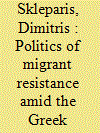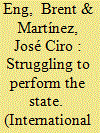|
|
|
Sort Order |
|
|
|
Items / Page
|
|
|
|
|
|
|
| Srl | Item |
| 1 |
ID:
155446


|
|
|
|
|
| Summary/Abstract |
This article sets out to analyze experiences related to refugeeness, or “becoming refugee.” It does so not as a technology of governmentality, but rather as the condition of possibility to political agency based on the capacities of asylum seekers to become attentive toward the figure of the refugee, to raise awareness of shared grievances and injustices and, ultimately, to mobilize individually and collectively. The study is based on an analysis of interviews carried out with asylum seekers in January 2015 in Cairo, a city that hosts one of the biggest UNHCR operations in North Africa and the Middle East. Approaching refugee subjectivities through the lens of performativity, we suggest that becoming refugee is one significant instance where people employ their mundane political agencies, both challenging and reproducing the complex socio-political and socio-material relations that constitute the refugee regime. We conclude that a focus on the subjective dynamism involved in performing refugeeness may be helpful in understanding political mobilization in demanding and oppressive situations in Cairo and beyond.
|
|
|
|
|
|
|
|
|
|
|
|
|
|
|
|
| 2 |
ID:
155445


|
|
|
|
|
| Summary/Abstract |
The quantification of problems that actors decide to understand and fix has become central to policy-making. However, this article suggests that critics of this move miss the point if their critique is limited to inadequate methods or inaccurate results. Dialoguing with recent literature on governance by numbers, the article argues that errors are not the issue. Taking development policy-making as an illustration, the article suggests that numbers in policy are increasingly imbued with a reasoning according to which it is only necessary to find “enough” correlation. By looking at “good enough data/methods/governance” in the World Bank and OECD in the context of the “fragile states” agenda, the aim is to show how imperfect methods and objects become authoritative while their imperfection is anything but hidden. As the pursuit of better numbers moves the wheel, the article suggests the need to learn more about authority and power in these dynamics by looking at how errors are a practical, accepted, and ubiquitous element in donors’ practices.
|
|
|
|
|
|
|
|
|
|
|
|
|
|
|
|
| 3 |
ID:
155444


|
|
|
|
|
| Summary/Abstract |
This research examines the work of international experts who promote and support democratization projects funded by Western governments and nongovernmental organizations. Based on interviews and participant observation research with professionals working in democracy assistance organizations, this study investigates the “back stage” practices that shape democratization projects in organizational head offices. Drawing on the recent scholarship on international practices and the culture of organizations, this article examines the ways democracy assistance organizations carve a particular niche within the broader field of international development aid by structuring their projects according to a practical theory of democratization. The article fits in the recent critical tradition that examines the practices of international aid organizations and poses questions about the type of democracy that North American aid organizations are promoting.
|
|
|
|
|
|
|
|
|
|
|
|
|
|
|
|
| 4 |
ID:
155442


|
|
|
|
|
| Summary/Abstract |
This paper focuses on a particular instance of migrant resistance: the hunger strike of three hundred irregular migrants in 2011 in Greece. It does not conceptualize the politics of migrant resistance as an isolated incidence of mobilization of irregular migrants against the government in support for their rights in existing institutions. By drawing on a set of fifty-two face-to-face semi-structured interviews with migrant protesters and organizers of the hunger strike, this paper rather argues that the politics of migrant resistance is performed in the daily lives and day-to-day activities of irregular migrants. It is performed by irregular migrants and those who stand in solidarity with them through the mundane production of information, tricks for survival, mutual care, social relations, services exchange, solidarity, and sociability, which challenge security policies and controls and establish an alternative form of life. The differential inclusion of irregular migrants in various social fields, and the leeway that this inclusion potentially creates in their daily lives and social relationships, enables irregular migrants to create ties with other agents/actors in dominated positions in their social fields, who possess and control the essential capital for the creation of these alternative modes of life.
|
|
|
|
|
|
|
|
|
|
|
|
|
|
|
|
| 5 |
ID:
155447


|
|
|
|
|
| Summary/Abstract |
This article argues for bringing struggles back into the practice turn in international political sociology. It will unpack a set of theoretical distinctions to respond to the following questions: How does one describe practices (relationalism vs. substantialism)? Where do practices occur (fields vs. communities)? How do practices change (disputes vs. struggles)? This article criticizes Pouliot and Adler for removing struggles from Bourdieu’s structural constructivism in order to frame practices as “the smallest unit of analysis” (Adler and Pouliot, 2011b, 10-13) in international relations (IR). The paper also takes stock of the constitutive differences between Bourdieu’s and Boltanski’s sociologies. It thereby faults Gadinger and Bueger’s practice theory for obfuscating these differences. Finally, in foregrounding struggles as a specifically social-constructivist concept, the argument will call for a more complex sociological understanding of conflict and change in IR. The analytical power of each set of theoretical distinction is illustrated through a case study of bordering struggles in post–Soviet Central Asia.
|
|
|
|
|
|
|
|
|
|
|
|
|
|
|
|
| 6 |
ID:
155443


|
|
|
|
|
| Summary/Abstract |
Recent studies of civil war have problematized frameworks that rely on a strict binary between state-sanctioned order and anarchy. This paper extends these insights and combines them with theories of performativity to examine welfare practices during the Syrian conflict (2011–2015). Specifically, we argue that conceptualizing the state as a construct—as an effect of power—can expand the study of civil war beyond its quantifiable aspects and embrace the performative dimensions of political life. By means of everyday, iterative acts such as welfare provision, competing groups summon the state, and the political order it seeks to enshrine, into existence: they make it both tangible and thinkable. During civil war, the ability to perform these prosaic acts becomes a matter of pressing military and political concern. Through close scrutiny of various cases, we dissect the impact of subsidized bread provision by the Assad regime, the Free Syrian Army, and armed Islamist groups as they struggle to perform the state. Our aim is to bring attention to under-studied governance practices so as to analyze the otherwise opaque relations between welfare provision, military success, and civilian agency during Syria’s civil war.
|
|
|
|
|
|
|
|
|
|
|
|
|
|
|
|
|
|
|
|
|